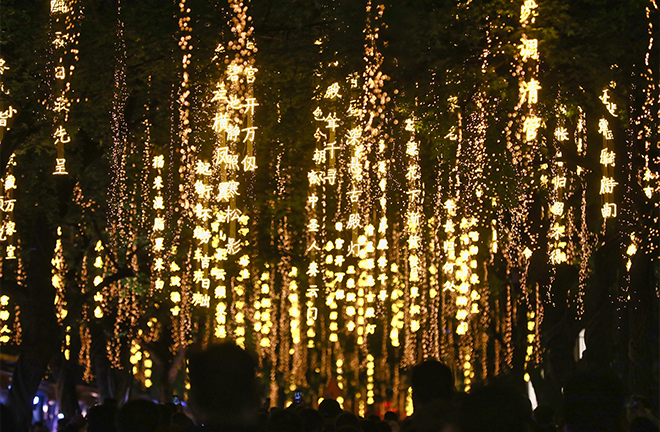Foreign literary studies imply rich cultural exchanges

Tree branches beside the Great Wild Goose Pagoda adorned with Tang poems in Xi’an, Shaanxi Province, on April 5 Photo: CFP
SHENZHEN—The Fourth Foreign Literature Summit Forum took place under the theme of “Mutual Learning of Civilizations and Foreign Literature Studies,” hosted by China University Alliance for the Development of Foreign Language and Literature Discipline, in Shenzhen, Guangdong Province.
Cultural exchanges
“Foreign literature serves as a window to appreciate diverse world civilizations, offering a path to understand various modes of thinking, aesthetic concepts, historical and present realities across different countries and regions in the world,” said Wang Lixin, a professor from the Center for Social Sciences at Southern University of Science and Technology. Historical exchanges and mutual learning between Chinese and other civilizations have exerted positive and far-reaching impact on both Chinese and foreign literature and culture.
Chen Zhongyi, Member of the Chinese Academy of Social Sciences (CASS) and a research fellow from the Institute of Foreign Literature at CASS, analyzed the stories in such world-famous masterpieces as Robinson Crusoe and One Thousand and One Nights. Many of the plots in these works have been subject to exchanges and rewriting by different nations, particularly by Arabians in central Eurasia. Historically, with the aid of printing, they translated and disseminated Western and Eastern classics respectively, substantially driving bilateral civilizational exchanges.
According to Peng Qinglong, a professor from the School of Foreign Languages at Shanghai Jiao Tong University (SJTU), the civilizational discourse of Eurocentrism and the cultural discourse of European and American monism demonstrate limited and biased Western perceptions that are characterized by binary opposition and ethnocentrism. These perceptions are manifested in the discourse of literary narratives. The underlying hegemonic thinking is not only the cultural root of global unrest and conflicts, but also the deep-seated cause of deteriorating Chinese-Western relations.
The China-proposed concept of a human community with a shared future, as well as the people-centered literary and artistic development concepts and practices, differ from Western perspectives on discourse and power. These ideas have gained wider recognition and acceptance around the world, Peng continued.
“Tang Dynasty (618–907) witnessed a splendid and brilliant culture, and Tang poetry represents a shiny treasure in the history of Chinese literature,” said Lu Jiande, director of the Center for Comparative Literature and Transcultural Studies at Xiamen University. Tang poets Bai Juyi and Yuan Zhen’s yuefu [a form of ancient Chinese poetry] record a wealth of details of lives at the time, while pertinent investigations conducted by historian Chen Yinque (1890–1969) further unfold the scrolls of Chinese-foreign exchanges. During the heyday of the Tang Dynasty, flourishing civilizational exchanges and mutual learning were commonplace. It is thought-provoking to note that many foreigners living in Chang’an [capital of Tang, present-day Xi’an] did not even consider themselves to be outsiders.
World literature
In recent years, there has been a growing trend in international historian circles towards global history, transcending the paradigms of “world history” that has been in place since the 19th century. Global history seeks to identify and explore the “connectedness” of the historical trajectories of Eastern and Western nations, which was universally ignored in the past, thereby viewing global history as an interconnected whole.
Zha Jianming, vice president of Shanghai International Studies University, noted that the history of world literature written with global history methods presents its external shapes as the relationship between endemicity and worldliness, but its deeper logic is rooted in human nature and literariness. Literature is a discipline of human nature, which, expressed in an artistic manner, constitutes the common logic all over the world. As such, the core of global history refers to the issue of “common poetics.”
As global history research emerges against the backdrop of contemporary economic globalization, it enlightens current world literature studies, said Liang Zhan, a research fellow from the Institute of Foreign Literature at CASS. The study of world literature should expand beyond traditional paradigms that focus primarily on national literature, and instead explore the connections between different national literatures, both internally and externally. In addition, it is necessary to transcend traditional communication methodologies, regarding specific national literature phenomena featuring globality as the enrichment and supplements of the same universal literary phenomenon proceeding from indigenous traditions. Moreover, it is sensible to identify the traits of national literature from its general connections with global literary phenomena, instead of simply taking one’s own national literature phenomena as mainstream which transcends national boundaries and impacts others.
“In discussing world literature, we need to see the role of poetry,” said Wang Ning, dean of the School of Humanities at SJTU. The concept of “world poetry” has ample proof. Outstanding poets have conducted bold explorations in terms of the theories and practices of poetic creations, some having even illuminated their own literary views.
Nie Zhenzhao, a professor from the Faculty of English Language and Culture at Guangdong University of Foreign Studies, suggested removing certain ethical barriers in literature studies, and abandoning the traditional objectivist concept of “seeing is believing” and “ideological” abstractionism, while still adhering to scientism. Only by integrating literary theories with science can we be lifted out of traditional ethical fetters and understand literature from a scientific perspective. The way out of literary research dilemmas directs to science and a foreseeable future. Traditional literature studies are bound to transform into digital literature and wisdom literature studies and into scientific literature research.
Edited by YANG LANLAN
